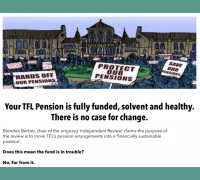Similar topics:
Attached documents
Your TFL Pension is fully funded, solvent and healthy.
There is no case for change.
Brendan Barber, chair of the ongoing ‘Independent Review’ claims the purpose of the review is to move TFL’s pension arrangements into a ‘financially sustainable position’.
Does this mean the fund is in trouble?
No. Far from it.
The value of the Fund stands at £13.1 billion in comparison to £10.6 billion a year ago. The fund’s finances are securely in credit with a funding level of 104. % We can have absolute confidence that we are fully funded. The Trustee Board is currently carrying out a triennial valuation of its finances. It is a legal requirement that this is done.
It is also a legal requirement that the fund’s trustees act in the best interest of the members of the fund by identifying and addressing any deficits in finances and the necessary remedial actions. The latest figures demonstrate there is no such need for concern as the fund is in very good health.
The final report from this actuarial valuation will be ready for publication in March 2022 by which time Barber’s review will have submitted its final recommendations on the future of our pension scheme. There is no logic to this sequence of events unless TFL is keen to keep the true extent of the Fund’s impressive solvency out of the evidence used as the base for its recommendations.
This brings us to the next question:
What is the real purpose of this review?
With the greatly diminished ability to generate income from fares and commercial ventures during the long days of the pandemic, TFL was left vulnerable to the political games of tory ministers. Rather than stand up to the Government and demand the necessary funding, TFL and Sadiq Khan embarked on a disastrous series of short-term deals where the pay and conditions of staff were offered up as a bargaining tool. Our occupational pension is included in these manoeuvres. It began with the other so-called ‘independent review’ of TFL finances set up by the mayor and the Transport Board in July 2020.
This panel of corporate experts was quick to identify the problem: the reduction and then withdrawal of any government funding to TFL under Conservative governments since 2015. An accompanying illustration of comparative urban transport authorities from around the world highlights that no other major city wasexpected to run without substantial funding not only during pandemics but at any
time. You might think that Khan’s review would conclude that the government needs to pay up. It doesn’t. It concludes you should help fund the shortfall with a degraded pension. The report lays the groundwork for what we now face with its disingenuous talk of reform and modernisation meaning dilution and decline.
‘Just a review’?
TFL commissioner Andy Byford and TFL’s own propaganda to members of the fund seeks to continually reassure that we should not be concerned by the review. The mayor’s own review recommended it; the government required it as part of June’s funding deal. We are expected to just accept it as inevitable. But it is these two parties that signed up to that deal. They have made the scheme a target by labelling it ‘too generous’, suggesting just as other workers’ occupational pensions have been systematically dismantled over the last two decades, here is an opportunity to do the same to London transport workers. The RMT, like any Trade Union worthy of its name, believes all workers have the right to a decent pension which will give them dignity in their later years after decades of employment. It is a disgrace that a Labour Mayor would endorse a review that recommends degrading our pension.
The Pensions Review panel has already been shown to be far from neutral and has strayed from its initial stated aims of considering both status quo and potential reforms for the scheme ‘ruling nothing out or nothing in’. The Chair of the TFL Pension Fund Trustee Board wrote to Brendan Barber concerned that the Review Panel had ‘moved the goal-posts’ as the Review Principles laid out suggest a determination to implement detrimental change regardless of the funding level or affordability.
RMT General Secretary Mick Lynch wrote to members on November 10th,
“The Board (Trustee) believes that the Review principles lead to the conclusion that the ultimate aim is to close the fund to new entrants or indeed cease future accrual” As previously stated, to initiate a review while the Fund is in the process of its own actuarial valuation is at best poor timing. Although the final report from the valuation will not be published until March 2022, figures have already shown that the fund will be very likely in surplus, and it will be at very least 100% funded. Of course, all future figures are to some extent forecasts but the same is true for the forecasting done by those arguing that the fund is not affordable to TFL. The difference is that the trustees are using the very latest figures which show the positive performance of the Fund’s investments.
The refusal of the Review to acknowledge the impact of the fund’s move from being in deficit (although only slightly) three years previously to a status of fully funded credit means it is not representing the true situation in regard to future affordability for the employer. Much is written in TFL propaganda to members about the current level of employer contribution to the fund. It is true that the current ratio of contribution employer: employee is 6:1. The reason for this ratio is largely the result of a deficit built up by the employer during a ten year period of underpayment and failure to pay in at all (so-called pension holidays). Previous agreements about funding are now in place which will prevent such a dereliction. The actuarial valuation determines what is needed from the employer to cover the fund’s liabilities.
Although the employers’ contribution cannot drop below a ratio of 2.5:1 the fund’s move into credit allows for a substantial fall from the current 6:1 without any negative impact on the Fund’s viability.
What can we and our unions do to defend our pensions? RMT and other Trade Union representatives take an active role in speaking up for the best interests of all members of the Pension Fund. We are united in our assertion that there is no case for any kind of change to our current pension arrangements. The wider Board of Trustees is of the same opinion.
When Brendan Barber called for the submission of evidence from all relevant parties, a Joint Trade Union Response from the Staff Side of the Pensions Working Group was prepared and submitted by ASLEF, RMT, TSSA and Unite. It is worthwhile for members to read this short document in full. Here is an extract: The synopsis to the review frames the issues in a way that is highly revealing, asking questions of whether other workers, regardless of where they work, receive benefits similar to those of TFL employees. This is a direct and leading reference to the nasty, divisive mantra used to drive a race to the bottom in the public sector pension schemes: that these schemes are somehow “gold plated”. This is pure political propaganda, designed to pitch working class people against one another in the interests of those who seek to drive down working-class living standards while protecting the wealth of the super-rich and promoting the parasitic profiteering of big business.
Pension reform should not be established on the basis of a race to the bottom, and we do not and will not accept workers being played off against one another. It’s clear our trade union representatives are united in a complete rejection of this ideological attack on our pension and have spoken up plainly to expose it. It’s now necessary for the same unity as we begin to ballot to defend our pensions, our jobs and our agreed working practices.
Your RMT pension representatives are:
- Steve Hedley Trustee and Pensions Working Group
- Paul Murphy Trustee and Pensions Working Group
- Sonja Folarin Trustee and Pensions Consultative committee Mark
- Harding Pensions Consultative Committee
- Jane Gwynn Pensions Consultative Committee
- Pete Woods Pensions Consultative Committee
RMT London Transport Pension Leaflet by RMT London Calling on Scribd
- 2816 reads






